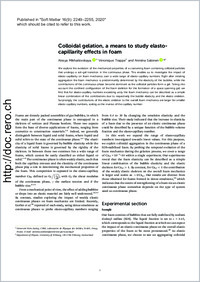Colloidal gelation, a means to study elasto-capillarity effects in foam
- Mikhailovskaya, Alesya Université Paris-Saclay - CNRS - Laboratoire de Physique des Solides - Orsay - France
- Trappe, Véronique Department of Physics - University of Fribourg - CH-1700 Fribourg - Switzerland
- Salonen, Anniina Université Paris-Saclay - CNRS - Laboratoire de Physique des Solides - Orsay - France
-
2020
Published in:
- Soft Matter. - 2020, vol. 16, no. 9, p. 2249–2255
English
We explore the evolution of the mechanical properties of a coarsening foam containing colloidal particles that undergo a sol–gel transition in the continuous phase. This enables us to investigate the impact of elasto-capillarity on foam mechanics over a wide range of elasto-capillary numbers. Right after initiating aggregation the foam mechanics is predominantly determined by the elasticity of the bubbles, while the contributions of the continuous phase become dominant as the colloidal particles form a gel. Taking into account the confined configuration of the foam skeleton for the formation of a space spanning gel, we find that for elasto-capillary numbers exceeding unity the foam mechanics can be described as a simple linear combination of the contributions due to respectively the bubble elasticity and the elastic skeleton. Surprisingly, the contributions of the elastic skeleton to the overall foam mechanics are larger for smaller elasto-capillary numbers, scaling as the inverse of the capillary number.
- Faculty
- Faculté des sciences et de médecine
- Department
- Département de Physique
- Language
-
- English
- Classification
- Physics
- License
-
License undefined
- Identifiers
-
- RERO DOC 328498
- DOI 10.1039/C9SM02301A
- Persistent URL
- https://folia.unifr.ch/unifr/documents/308597
Statistics
Document views: 123
File downloads:
- pdf: 356
